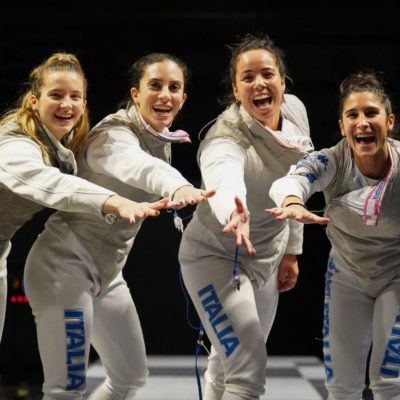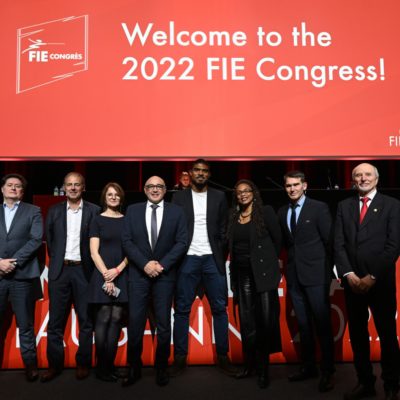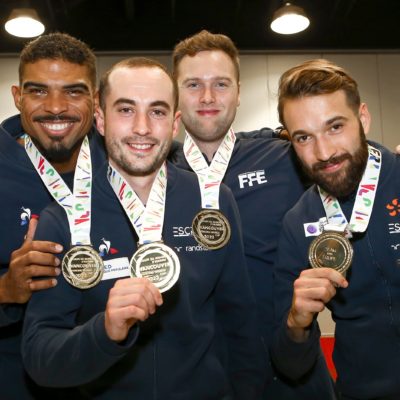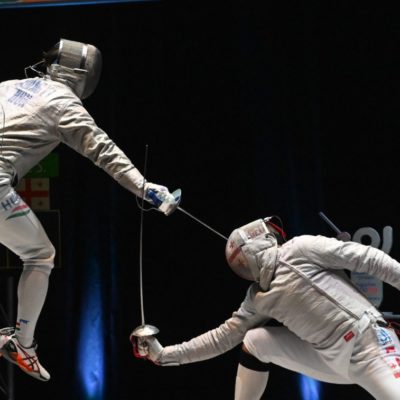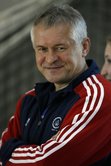 Ed Korfanty is the US Women’s Sabre national coach and personal coach to Mariel Zagunis and Rebecca Ward.
Ed Korfanty is the US Women’s Sabre national coach and personal coach to Mariel Zagunis and Rebecca Ward.
Serge caught up with Ed Korfanty in China to discuss the world cup results and just why the US does so well individually but seems challenged in the team events.
{audio}https://fencing.net/podcast/chn-korfanty2.mp3{/audio}
The US Women next compete at the Las Vegas Grand Prix event.
Full Transcript:
Interviewer: We’re with Ed Korfanty in Tianjin, China at the completion of a tour of Asia with the Women’s Sabre Team. I know you’ve had a chance to visit the Beijing Olympic site, and we’ve had a lot of good fencing competition. First, tell us a little bit about what you saw in Beijing in preparation for The Olympics. What’s the facility like, and how does it look like it’s being prepared?
Ed Korfanty: I’m very impressed by China, what they’re doing over here with the preparation is going on. We didn’t have a chance to see the site of the competition, but I saw the place that we’re gonna spend some time before Olympic Games. So, nice place in a leisure city. We’re gonna have great conditions for the practice.
Interviewer: And tell us a little bit more about the Chinese – what you’re expecting with the Chinese preparation for The Olympics, and how they’re going to organize and run the event?
Ed Korfanty: Yeah, they run a very well competition. I can see on this Grand Prix. It’s nicely organized, perfectly done everything, and it’s gonna probably happen on Olympic Games. The preparation Chinese athletes, you know, they spend a lot of time, effort, and money, you know, to prep everything, and they have a good coach. They get not long ago from Italy, Christian Bauer who trains them, and then trying to improve their tactical part of the bout, and I think that they will be very good people and very clean, very tough team to beat.
Interviewer: How has the tour been so far with this Grand Prix series? You were just in Hanoi, and now we’re in Tianjin. Tell us a little bit about how everyone’s performing.
Ed Korfanty: You know, I’ve been pleased from this tournament. There a very, very big problem to adjust to the timing, and the tournament, and the climate of course, and we have a pretty good tournament in Hanoi. We did very well. We had three girls in the finals. In this tournament, two made it for the top eight, and we met, unfortunately, each other, and also four girls we get to the top 16 and they fence each other.
Interviewer: What are you focusing on mostly now in training with the team?
Ed Korfanty: We try to get together, because we don’t have too much occasion, the whole team, and then we try to talk about how to fence other teams. We talk about preparation that we’re gonna have before World Championship, and then what we can expect for next season. We’re planning some camps. I’m planning some camps before World Championship, after World Championship before Olympic Games. So, I am very optimistic and looking forward.
Interviewer: The U.S. team has been so successful, and individually they’ve been so successful, that they are obviously the team to beat in Women’s Sabre. If you were one of the other teams – if you were, say, Tulia’s coach, or you were the coach of some of the Chinese fencers, what is it that you would be working on to be able to beat the Americans?
Ed Korfanty: You know, all of them, they have very, very high tech cameras. They’re filming us, and then they have it their own way to find out what’s going on. We also, we’re doing the same thing. We have a DartFish, a high – very specific problem, you know, to analyze the bouting. So, we’re doing this part too, but you know the problem is that many times on the World Championship Olympic Games, you know, ‘cause we have a very good individuals. We’re always getting to the final top lately. We have a little bit of a problem with team competition, because they’re exhausted after two individual tournaments, and they’re focus on the team is not as good as the team that has only one final. Only difference ____ the two pairs, you know, and the team always perform well. Like, for example, Ukraine, they don’t do well individually, but they’re a very strong team during the Grand Prix Tournament.
Interviewer: So, what do you do as a coach, when you have to, obviously, coach a wide variety of personalities? You have to deal with a fencer’s individual coaches. You have to deal with parents, because the U.S. seems to bring more parents with it than any other country. So, how do you manage that as the team coach? How do you stay in control, and yet, still encourage and support your athletes?
Ed Korfanty: It is tough job, but, you know, I know those athletes. I know parents, and I know what to expect from them. So, I try to be, you know, a little bit focused only on the fencing and my athletes, what they’re supposed to do. They know me also, my expectations from them, and a team is practically taken from my class, Sabre, Jacobson, and the upcoming fencers like Mara Bogniak. So, this time I probably will end up to qualify to the World Championship this year and probably to The Olympic Games.
Interviewer: So, tell me what’s coming next. Tell us what’s coming next in the series in the next few months.
Ed Korfanty: We have two left competitions. There’s one is gonna be in Hanoi – I mean, Havana is gonna be a World Cup, and then the very important competition for us in Las Vegas Grand Prix, the last tournament, and we’ll see our position to the next year.
Interviewer: Is there any issue of zonal qualification? Is that the Las Vegas tournament?
Ed Korfanty: Somehow it’s different story, Europe, they have a after Vegas European Championship. We already have the Pan American Games. We’re gonna have next year also this competition, but for us, it’s very important performance on the Grand Prix.
Interviewer: And how does U.S. Nationals play into all of this?
Ed Korfanty: (Laughter) I think it’s okay, you know.
Interviewer: Okay. And I guess the final question is, tell us about St. Petersburg. So, what are you thinking about in terms of qualification for that, and how is the progress for that going? How many fencers are we taking?
Ed Korfanty: Those going to Pan American with the World Championship and then point standing now that the World Championship multiple competition, because they – we can have the biggest points over there. So there’s a three times point from the World Cup, and the Grand Prix has a two times points from the World Cup. They’ve got a World Cup. So, yeah, you know, our focus be, we have a good plan for preparation for the Moscow too, and I’m gonna be going to Europe for practice, competition trial, to adjust the time and then I think we’ll be ready for World Championship.
Interviewer: At what point will we know the complete group that’s going to The Olympics, who qualifies? Will it be after St. Petersburg?
Ed Korfanty: No, it’s either after the Championship World, we have a few months of preparation to the main season, and it starts again in 2008, January, and then we go to March. March is the – end of the March is the day that they select individual athletes to The Olympic Games.
Interviewer: Okay. Well, thank you very much. We appreciate your time, and good luck with the season.
Ed Korfanty: You’re welcome. Thank you.
[End of Audio]


